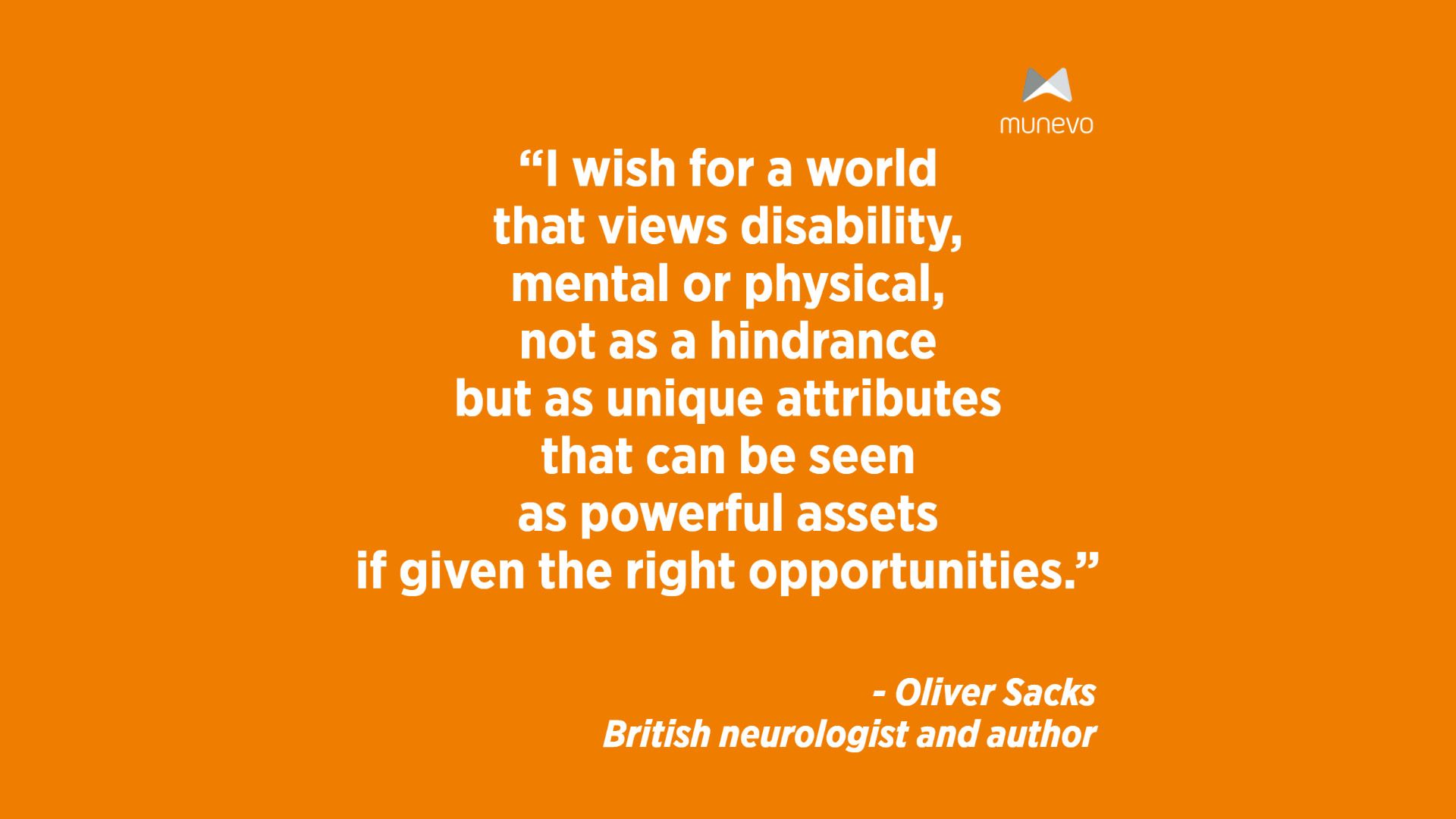January 30, 2023
Stepping Stones to Inclusion: Reframing Disability

"I wish for a world that views disability, mental or physical, not as a hindrance but as unique attributes that can be seen as powerful assets if given the right opportunities." - Oliver Sacks British neurologist and author
People with disabilities are often seen as a burden to society and may be viewed as people who can't contribute. They are said to only take away from the resources others could make better use of. This negative view of disability is not only harmful to people who live with disabilities. It also creates even more barriers that prevent people with disabilities from fully participating in society. Therefore, reframing disability is an essential stepping stone to inclusion.
Creating a new narrative around disability
To create an inclusive environment where all people can contribute their unique perspectives, we can consequently begin by reframing our view of disability. All in all, it's quite simple to use more empowering and inclusive language.
Let’s look at a few examples!
- Instead of using phrases like “suffering from disability”, which includes (frankly quite poor) judgement, we may just say “has a disability”.
- Let’s not talk about a person being “tied to their wheelchair”. We want to emphasize the personal freedom and independence all assistive technology provides to people - and consequently, just call it “using a wheelchair” or “driving a wheelchair”.
- We’ve already written about accessibility in our last blog post: a wheelchair is not keeping its driver from entering a building. It's the building that does not provide sufficient accessibility.
- Also, we may not want to talk about having a “blind spot” anymore. Instead, we can say that there may be a “gap in our perception”.
You get the picture: an important step to reframing disability is reflecting on the language we’re using. In turn, the perception of language also has a powerful influence on people’s views.
The importance of role models
Simultaneously, let’s raise awareness for the importance of role models who embrace their differences! Role models show others how they can be successful with disabilities. They are inspirational figures exemplary for people with disabilities. Role models help to feel accepted and included in society.
There are a lot of role models out there to follow - it's beneficial to get their perspective first-hand in their won words. Why don't you start with our brand ambassadors Saskia and Brook?
Both Saskia and Brook are strong advocates of their communities. They're leading interesting, inspirational lives with lots of powerful stories to share.
Disability and representation
Representation is a powerful tool to reframe our views on disability. Showing people with disabilities in a realistic, positive light - whether it's through media, art, or simply by having more visible representation in everyday life - can help change the way people think about disability.
Fun examples for representation can be found in the book “Reframing Disability in Manga” by Yoshiko Okuyama. The author analyzes popular Japanese manga published from the 90s to the present that portray the everyday lives of adults and children with disabilities in an ableist society.
Reframing disability through education
Another way to help reframe the way society views disability is through education. For one thing, it's important for people to understand that disabilities are not always visible. And likewise, that just because someone doesn't "look disabled", doesn't mean they aren't. It's also important to learn about the various types of disabilities and how they can impact a person's life.
The Disability Center of UA Little Rock is a great example for available resources on reframing disability. They help people to see disability less as a burden or limitation, but rather as an opportunity for growth, learning and adapting differently.
Obstacles and opportunities
By reframing our view of disability from one that sees disability as an obstacle to one that embraces differences and celebrates diversity, we can create a more inclusive future for everyone in our society. As we’ve learned, there are many ways each of us can help to reframe the way society views disability.
“The most interesting people you'll find are ones that don't fit into your average cardboard box. They'll make what they need, they'll make their own boxes.”
- Dr. Temple Grandin, American academic and animal behaviorist with autism
Obviously, improving understanding, communication, education and visibility around people with disabilities can help to create a more inclusive world for everyone. Consequently, telling the story of people with disabilities in an inclusive, empowering and beneficial way requires us to look at the potential benefits that also come along with disability rather than focusing solely on the downsides and limitations.
In general, society has been viewing disability through a lens of pity for far too long. It's time to reframe the way we think about disability. One of the best ways to do that is through inclusion. Inclusion doesn't just benefit those with disabilities. Inclusion benefits everyone.
By including people with disabilities in all aspects of life, we create a more tolerant, understanding world for everyone. We also open new possibilities and perspectives that can be transformative for us all.
Written by DM.
Coming up…
In our next blog post we’ll take a closer look at ending ableism. Stay in the know on the latest blog posts - subscribe now to our munevo newsletter. We won't spam or annoy you, promise.